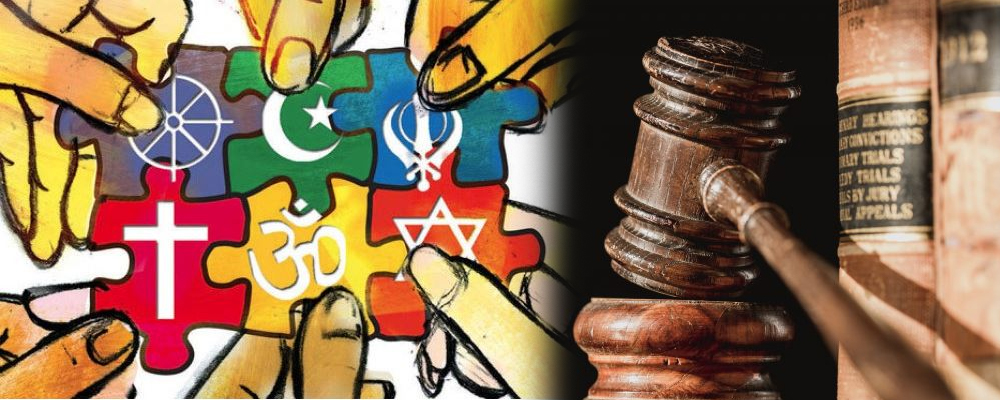According to Article 25 of the Constitution of India, all persons have the right to freely practice, profess and propagate religion keeping into consideration public order, morality and health. In terms of conversion, if one wishes to convert to another religion, he has to follow the procedure his state has mentioned in the anti-conversion Act passed by the respective state (if the state has passed one). The Hon’ble Supreme Court while deciding the validity of the anti conversion, Acts passed by the states of Orissa and Madhya Pradesh, observed that “what is freedom for one is the freedom for the other in equal measures and there can, therefore, be no such thing as a fundamental right to convert any person to one’s own religion”.
Legislative and judicial history of anti-conversion laws in India-
Anti conversion laws are not something which came into existence recently, the demands to curb proselytism were being made even during the British era, it was opposed by Mahatma Gandhi when missionaries were using famine in a village to proselytize the local poor villagers to abandon their beliefs and to accept Christianity.
Many princely states such as the States of Udaipur, Kota, Jodhpur, etc. At the time also passed anti-conversion laws such as the Raigarh Conversion Act, 1936 which was passed by the Raigarh Princely State.
After independence demands were made at the time to introduce anti conversion laws in the Constitution, however the Constituent Assembly at that time left the matter with the Judiciary to adjudicate.
The first law to be passed in the country against conversion was Madhya Pradesh Dharma Swathanthraniya Adhiniyam, 1967 (“MP Act”), which was passed by the state of Madhya Pradesh, after a report was submitted by the committee appointed by the state government after many instances of rampant conversions and proselytization came into light. The report explained the malpractices by the missionaries in duping the poor people.
Later the State of Orissa also passed the Orissa Freedom of Religion Act, 1968 which also added the word ‘inducement’. Both the Acts were challenged before their respective states’ High Courts.
The grounds urged before the High Courts were-
The states do not have the competence to pass the legislation under “Public Order” in item I, List II in the Schedule VII of the Constitution of India.
The law is ultra vires to Article 25(1) of the Constitution.
Also the Section 5 of the Act, which requires the person converting to intimate the same to the District Magistrate is violative of the Article 20(3) of the Constitution.
The Full Bench of Hon’ble High Court of Madhya Pradesh upheld the validity of the Act, and referred to several judgments to explain that the term “public order” has a wider meaning and these rampant conversions could ultimately lead to disruption in the public order. Also, the Section 5 of the Act is not against Article 20(3), as there is no mention of fraud, force or allurement, but a mere intimation of the act of conversion.
However the Division Bench of the Orissa High Court declared the Act passed by the State Legislature as unconstitutional. The Court had the opinion that the Parliament could have passed such law under item 97 of List I of the VII schedule of the Constitution. Also that the term ‘inducement’ is too vague and passing the banning of conversion under inducement is violative of the Article 25(1) of the Constitution of India.
The matter thus, reached the Hon’ble Supreme Court of India, where 5 Judge Bench in. Rev. Stainislaus v State (1977), upheld the judgment passed by the High Court of Madhya Pradesh and reversed the judgment of the Orissa High Court, thus validating the Acts passed by the legislatures of Madhya Pradesh and Orissa. The Apex Court observed that Article 25 (1) the Right to Propagate one’s religion does not provide fundamental right to any person to convert someone else to one’s own religion. Further, if someone forcibly converts anyone else’s religion, it may cause a breach of public order, affecting the society at large.
Legislative History-
Apart from the above-mentioned Acts, many states have also passed their own version of the anti-conversion law, they have either been repealed or were challenged before the Court of law.
In the year 2002, the state of Tamil Nadu passed the Tamil Nadu Prohibition of Forcible Conversion Act, 2002. But due to severe opposition the same was repealed in the year 2004
To protect the identities of the indigenous tribes in the state, the state of Arunachal Pradesh passed the Arunachal Pradesh Freedom of Religion Act, 1978 in the year 1978.
The Gujarat State passed the ‘Gujarat Freedom of Religion Act, 2003.
Jharkhand and Uttarakhand passed the anti- conversion law in the year 2017 and 2018 respectively.
Based on the HP Act regarding the anti-conversion law, in the year 2021, the Karnataka State Legislative Assembly, Karnataka Protection of Right to Freedom of Religion Bill, 2021 was passed, however, it is still pending before the Legislative Council, i.e. The Upper House of the state.
Conclusion-
From the above article it can be inferred that “freedom to convert” is no Fundamental Right and any law which prohibits such conversion by way of force, fraud, allurement or inducement would be according to the limitations provided under Article 25 of the Constitution of India. Thus, the state legislatures are well within their jurisdiction to prohibit conversions by force, fraud, allurement or inducement.
These prohibitive laws are required to ensure that indigenous faith in our legal system and to respect the plurality and diversity of the country.





 Talk to a Lawyer
Talk to a Lawyer